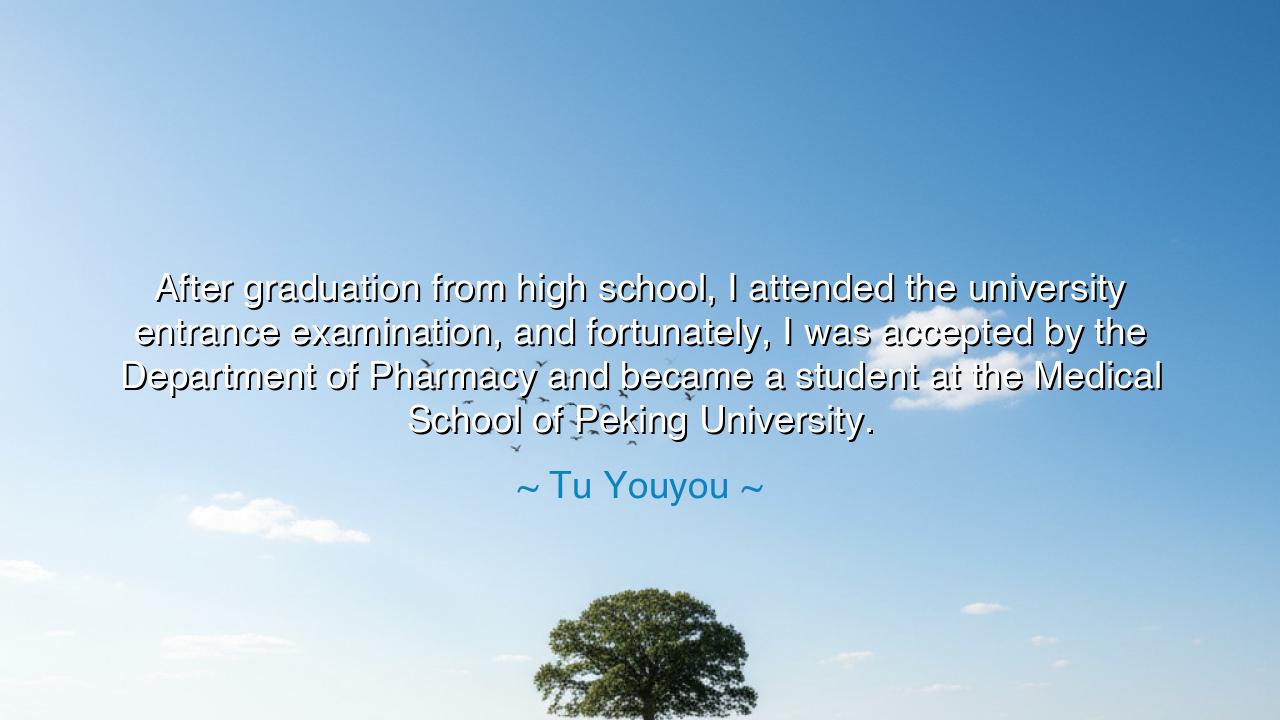
After graduation from high school, I attended the university
After graduation from high school, I attended the university entrance examination, and fortunately, I was accepted by the Department of Pharmacy and became a student at the Medical School of Peking University.






In the quiet grace of the words — “After graduation from high school, I attended the university entrance examination, and fortunately, I was accepted by the Department of Pharmacy and became a student at the Medical School of Peking University” — Tu Youyou reveals not merely a step in her academic journey, but the beginning of a destiny that would one day heal millions. Beneath the modest tone of her recollection lies the spark of an ancient truth: that greatness often begins in silence, and that those who seek knowledge with pure intent may unknowingly walk toward immortality.
Born in a time of turmoil, when China was still mending from the scars of war and poverty, Tu Youyou’s choice to enter the Department of Pharmacy was not a path of glamour, but one of duty. To study medicine, in those years, was to take upon oneself the burden of life and death — to learn not for self-advancement, but for the betterment of humankind. The Medical School of Peking University became her temple, and the discipline of pharmacy her sacred scripture. What she saw then as “fortune” was, in truth, the alignment of fate and purpose, where perseverance met providence.
The ancients taught that the journey of a thousand miles begins with a single step, yet they did not tell us that this step often feels uncertain, humble, even unremarkable. Tu Youyou’s story reminds us that true calling does not arrive in lightning or applause, but in quiet beginnings — a young woman studying compounds, poring over old texts, and believing that somewhere in the wisdom of nature lay the cure for suffering. From that university hall would one day emerge the discovery of artemisinin, the life-saving treatment for malaria — a revelation that would echo through continents, sparing millions of souls from death.
In her early days at Peking University, Tu Youyou immersed herself not only in modern pharmacology but also in the ancient wisdom of Chinese medicine. It was this union of East and West, of tradition and innovation, that later shaped her approach to research. The girl who once considered herself “fortunate” to be accepted into a medical school became the woman who changed the history of medicine. This is the paradox of destiny: the humble student becomes the teacher of nations, the seeker of herbs becomes the discoverer of salvation.
Consider also the parallel story of Marie Curie, who, in her own modest beginnings, studied physics and chemistry in Paris, unaware that her experiments would illuminate the hidden powers of the atom. Both Curie and Tu Youyou shared the same spirit — a devotion to truth and service, not fame. They remind us that those who study not for recognition, but for understanding, ultimately create the breakthroughs that reshape humanity. It is a universal pattern: modesty at the beginning, greatness at the end.
The deeper meaning of Tu Youyou’s words lies in her use of the word “fortunately.” She viewed her acceptance into Peking University not as a personal triumph, but as a gift — a trust placed upon her shoulders by destiny. This humility is the mark of wisdom. For the wise never claim ownership of their path; they see themselves as instruments through which purpose flows. In a world obsessed with titles and achievements, her words stand as a quiet rebuke — reminding us that fortune favors not the proud, but the diligent, the patient, and the sincere.
The lesson is timeless: every beginning, no matter how small, can hold within it the seed of greatness. The door to destiny often opens quietly, disguised as an opportunity to learn, to study, or to serve. What matters is not where we start, but how faithfully we walk the path. Knowledge, when sought with compassion, becomes healing; and education, when guided by purpose, becomes legacy.
So let the reader take this to heart: when fortune grants you a chance to learn — whether in school, in hardship, or in silence — take it as Tu Youyou once did. Embrace it with gratitude. Pour your heart into your craft. For someday, the work of your hands may reach far beyond what your eyes can see, and like hers, your humble beginning may become a light for generations yet unborn.






AAdministratorAdministrator
Welcome, honored guests. Please leave a comment, we will respond soon